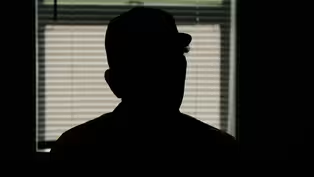
A Country Divided
Clip: Season 4 Episode 29 | 9m 52sVideo has Closed Captions
An author details Abraham Lincoln’s trip to Washington, D.C., leading up to the Civil War.
Author and historian Ted Widmer chronicles Abraham Lincoln’s 13-day train ride to Washington, D.C., where the president-elect is headed for his inauguration. Widmer, who lives in Rhode Island, also talks with Rhode Island PBS Weekly about the similarities between the days leading up to Lincoln’s inauguration and the assault on the Capitol in 2021.
Problems playing video? | Closed Captioning Feedback
Problems playing video? | Closed Captioning Feedback
Rhode Island PBS Weekly is a local public television program presented by Ocean State Media

A Country Divided
Clip: Season 4 Episode 29 | 9m 52sVideo has Closed Captions
Author and historian Ted Widmer chronicles Abraham Lincoln’s 13-day train ride to Washington, D.C., where the president-elect is headed for his inauguration. Widmer, who lives in Rhode Island, also talks with Rhode Island PBS Weekly about the similarities between the days leading up to Lincoln’s inauguration and the assault on the Capitol in 2021.
Problems playing video? | Closed Captioning Feedback
How to Watch Rhode Island PBS Weekly
Rhode Island PBS Weekly is available to stream on pbs.org and the free PBS App, available on iPhone, Apple TV, Android TV, Android smartphones, Amazon Fire TV, Amazon Fire Tablet, Roku, Samsung Smart TV, and Vizio.
Providing Support for PBS.org
Learn Moreabout PBS online sponsorshipand if he slows down too much, he becomes vulnerable again because when he's standing still is when someone can get close to him with bad intent.
- [Reporter] That fast moving man was Abraham Lincoln onboard a train headed to his inauguration in Washington DC.
Historian and Rhode Island-based author Ted Widmer spent years combing through newspaper articles and research retracing Lincoln's 13-day journey starting in Illinois.
- I went into a deep vortex, almost like time travel, and I would go anywhere I could find out a shred of information about anything that happened to Abraham Lincoln during these 13 days.
- It was February of 1861, Lincoln was receiving daily death threats over his opposition to slavery.
Seven states had already seceded from the union and the nation was on the cusp of a civil war.
You write a great deal about how there was a lot at stake as Lincoln made his way toward Washington DC.
What was that risk?
- Well, the survival of democracy basically, and a kind of principled democracy that really believed in the worth of every individual.
So if this form of self-government is going to survive, we need a strong United States of America to show people how it's done.
- [Reporter] In "Lincoln on the Verge," Widmer follows the President-elect's 1,900-mile route through the capitals of Indiana, Ohio, New York, New Jersey, and Pennsylvania, states that had elected him.
- In the north, there is hope that he will come in and be a strong president, but there's a lot of anxiety, there has never been a president from this party.
It's a brand new party called the Republican party.
And the idea that a new kind of a president is coming in and may get rid of slavery or will somehow inhibit the spread of slavery, that's scary to Northerners too, including in Rhode Island because there are northerners with extensive economic interests in the south, but in the south it's much worse than anxiety, it's really hatred.
He has built up in the Southern press as a kind of monster.
- [Reporter] As Lincoln was on route to Washington, his rival Jefferson Davis was rushing toward his own inauguration in Montgomery, Alabama.
Widmer describes it as a race between two competing philosophies.
Widmer says, digging through this chapter of Lincoln's life was a labor of love, and his passion for history is evident and on display in his home on the east side of Providence, from his collection of old maps to this portrait of Lincoln.
- Something about him has always attracted me the way it attracts millions of Americans.
Something in the sadness of the face and the incredible story.
We talk about rags to riches and the American dream, but no one ever came from as obscure a background and achieved as much as as Abraham Lincoln.
And he literally saved our country.
- [Reporter] Many people saw Lincoln for the first time during his inaugural train ride to DC.
He stopped in eight states, ultimately shaking thousands of hands.
But that trip could be viewed as a foreshadowing of what was to come.
- At the very beginning of the trip, there was a device found on the track, even in Illinois near the border with Indiana, on the very first day that someone had put there to cause some mayhem.
It was found by people looking ahead on the route.
And so the danger was removed.
But then in Cincinnati, a couple days later, a bag was placed with an explosive device in Lincoln's cart moments before he got onto the train and it was found and removed.
- There were dangers at every corner, including a plot to kill him in Baltimore.
Still, Lincoln gave about 100 speeches throughout the trip on and off the train.
"To shore up Democracy," writes Widtmer, "Lincoln needed to speak every time that a crowd formed near his train."
- He's walking a tight rope.
He knows he is facing real danger.
He's been informed about this plot and every day they're getting more information about it.
So he's literally heading into the jaws of danger.
I mean, he's heading toward Baltimore.
There's no way he can get to Washington without going through Baltimore.
But he also just has an intuitive sense that he's gotta get out there and talk about America and talk about himself and sell the idea of the Lincoln presidency to a public that still feels a lot of doubt and anxiety before he has even become president.
- As the president-elect was traveling through Ohio, Congress was meeting to certify the results of the 1860 election.
But Widmer says it was a fraught day as Lincoln haters tried to disrupt the count.
- There were actually crowds trying to get into the Capitol just like on January 6th.
There were unruly sort of drunken men swearing, trying to get in, but then inside there were politicians giving speeches denouncing the result just like we saw on January 6th.
- [Reporter] There were fears that Congress might take over the election.
A lot of power lay in the hands of Vice President John C. Breckenridge, a pro southern candidate who also ran against Lincoln.
- He's the winner who's in charge of counting the electoral votes and he refused to cheat.
He's kind of like Mike Pence in this story.
He refused to cheat and he presided over an honest count that declared Lincoln the President-elect.
- [Crowd] Hang Mike Pence!
Hang Mike Pence!
- [Reporter] Widmer's book was published in 2020, nine months before the insurrection on the Capitol.
(crowd chanting) As he watched the attack unfold, Widmer was struck by the similarities between that day and the days leading up to Lincoln's inauguration.
- One of the moving parts of my book was that ordinary people started walking around the Capitol to defend it in the days when they felt that there might be a pro southern takeover of the Capitol before Lincoln even got there.
And people like firemen, blacksmiths, just sort of the working people of Washington DC did not wanna see a coup happen in their city.
I mean it's where they're from and they came out and sort of patrolled around the Capitol to keep an eye on it.
And we need to be the same way in 2022.
- [Reporter] Wyoming Congresswoman Liz Cheney read Widmer's book before the attack on the Capitol, the lifelong Republican lost her congressional seat after sitting on the House January 6th Committee.
- I will not sit back and watch in silence while others lead our party down a path that abandons the rule of law and joins the former president's crusade to undermine our democracy.
- [Reporter] Widmer says Cheney recently called him to talk about the book.
She worried about what might have happened had the Capitol rioters got in their hands on the boxes containing the electoral votes.
- Her political intelligence is so sharp, she knew that was a weak point in our system and that we needed to be really careful on the day of the counting of the electoral votes.
So she said my book gave her some foreknowledge that was very valuable to her that day.
- It's been more than 160 years since Lincoln's inaugural train ride.
But Widmer hopes that what happened back then continues to resonate today.
What's the main thing you want readers to take from your book?
- I want them to look at Lincoln as a flesh and blood human being, not someone we see in a statue or a painting and can't connect to.
He was very brave and stood up for his country when his country needed him.
And from those understandings of Lincoln, I hope we can all for ourselves find some of those same qualities.
January 6th showed how fragile our very strong country actually is.
And so we all need to stand up individually, but also helping each other.
And I think we'll be a better country if we do that.
- Finally tonight in our continuing My Take series,
Video has Closed Captions
Clip: S4 Ep29 | 10m 21s | A follow-up report on the 49 migrants brought to Martha’s Vineyard. (10m 21s)
Video has Closed Captions
Clip: S4 Ep29 | 5m 30s | A musician sheds light on the captivating story of Black folk music. (5m 30s)
Providing Support for PBS.org
Learn Moreabout PBS online sponsorship
- News and Public Affairs

Top journalists deliver compelling original analysis of the hour's headlines.

- News and Public Affairs

FRONTLINE is investigative journalism that questions, explains and changes our world.












Support for PBS provided by:
Rhode Island PBS Weekly is a local public television program presented by Ocean State Media

